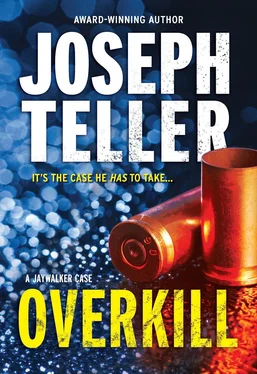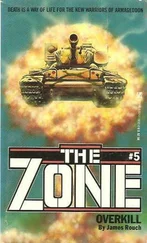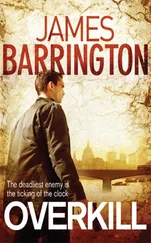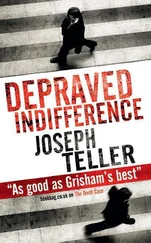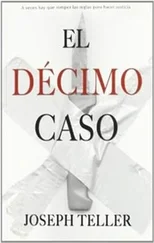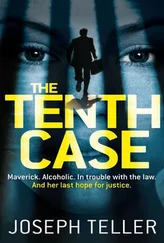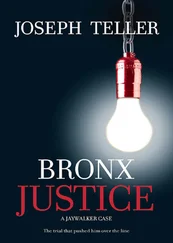Joseph Teller - Overkill
Здесь есть возможность читать онлайн «Joseph Teller - Overkill» — ознакомительный отрывок электронной книги совершенно бесплатно, а после прочтения отрывка купить полную версию. В некоторых случаях можно слушать аудио, скачать через торрент в формате fb2 и присутствует краткое содержание. Жанр: Криминальный детектив, на английском языке. Описание произведения, (предисловие) а так же отзывы посетителей доступны на портале библиотеки ЛибКат.
- Название:Overkill
- Автор:
- Жанр:
- Год:неизвестен
- ISBN:нет данных
- Рейтинг книги:3 / 5. Голосов: 1
-
Избранное:Добавить в избранное
- Отзывы:
-
Ваша оценка:
- 60
- 1
- 2
- 3
- 4
- 5
Overkill: краткое содержание, описание и аннотация
Предлагаем к чтению аннотацию, описание, краткое содержание или предисловие (зависит от того, что написал сам автор книги «Overkill»). Если вы не нашли необходимую информацию о книге — напишите в комментариях, мы постараемся отыскать её.
Overkill — читать онлайн ознакомительный отрывок
Ниже представлен текст книги, разбитый по страницам. Система сохранения места последней прочитанной страницы, позволяет с удобством читать онлайн бесплатно книгу «Overkill», без необходимости каждый раз заново искать на чём Вы остановились. Поставьте закладку, и сможете в любой момент перейти на страницу, на которой закончили чтение.
Интервал:
Закладка:
“Now let me say this,” he continued, removing his glasses and looking up from his notes. “Despite rumors circulating to the contrary, I am a human being. I listened to the same testimony that you did. I have read your most recent note and understand your concerns. You may rest assured, each of you, that if and when it comes time for me to impose sentence upon Mr. Estrada, I will take into consideration all of the facts and circumstances of this very tragic case.
“I trust that answers your question,” he told them. “Now you may retire and resume your deliberations.”
Not that Jaywalker hadn’t argued long and hard against what Wexler had proposed to say. Wrapped in all those comforting words was an implicit promise to treat Jeremy with not only understanding but leniency. But sentencing wasn’t “solely the province of the court” at all. By imposing strict minimum terms, the legislature had made it very much its province, as well. Wexler could go on as long as he liked about being a human being, understanding the jurors’ concerns and considering all aspects of “this very tragic case,” but murder sentences still began at fifteen to life, and first-degree manslaughter at five years, which Jeremy could surely forget about, having just turned down fifteen on a plea . Therefore, Jaywalker contended, the judge was playing fast and loose with the jurors, lulling them into thinking Jeremy would get at most a slap on the wrist if they were to convict him, when in fact a lengthy prison term awaited him.
“You have your exception,” Wexler had told him. Which in layman’s terms translated into “Shut up and sit down.” And the fact was, as duplicitous as the judge was being, he was standing on pretty solid ground, and he’d no doubt known it. The genteel way in which he’d answered the jurors’ question had hewed closely enough to the law-which did indeed leave sentencing up to the court and not the jury-that it would no doubt satisfy the concerns of any appellate judge reviewing the statement long after the conviction.
So forty minutes later, when the buzzer sounded not once, but twice, nobody in the courtroom was surprised. Not Jaywalker, certainly, who’d known precisely what would happen next. Not Katherine Darcy, who looked sympathetic to his concerns but obviously felt powerless to do anything about them. Not the court officers, who even as they mumbled that Jaywalker had been shafted-which wasn’t quite how they phrased it-called for reinforcements, a guilty verdict being a time when even the most docile of defendants tended to act out unpredictably. Not Harold Wexler, who made a point of loudly asking the clerk what a convenient sentencing date might be. Not Carmen or Julie, who sat in the audience hugging each other, sobbing softly. Not even Jeremy, who for once lowered his head and seemed intent on studying the floor, the sheepish smile finally gone from his face.
“Mr. Foreman, please rise.”
As he had on each previous occasion, William Craig stood. At the defense table, so did Jaywalker and Jeremy. By now they knew the ritual well enough that they no longer waited to be asked.
“Mr. Foreman, has the jury reached a verdict?”
“Yes, we have.”
In his right hand he held a single sheet of paper, called a verdict sheet. It listed the different counts of the indictment in order, by number and crime charged. Jaywalker knew from years of experience that whatever Mr. Craig were to do with it next would be a tell, an indication whether the jury had convicted Jeremy of all twelve counts or just some of them. If it was all, Mr. Craig would have no need to refer to the sheet; he could simply say the word “Guilty” each of the twelve times he was asked. So, too, if all of his responses were to be “Not guilty.”
“With respect to the first count of the indictment,” said the clerk, “charging the defendant with the crime of murder. How do you find the defendant, guilty or not guilty?”
William Craig lifted the verdict sheet and looked at it. So it was to be a split decision, Jaywalker immediately knew, a mix of convictions and acquittals. Guilty of murder but not manslaughter, for example. Or, God willing, the other way around. It had come down to that, Jaywalker the atheist praying for the compromise verdict he’d begged the jurors not to settle on.
“Not guilty,” said Mr. Craig.
Jaywalker exhaled ever so slightly and thought he felt Jeremy do the same alongside him. So it was going to be a manslaughter conviction. A victory of sorts, one most lawyers would be thrilled with, given how close they’d come to a murder conviction.
“With respect to the second count of the indictment,” said the clerk, “charging the defendant with the crime of manslaughter in the first degree. How do you find the defendant, guilty or not guilty?”
“Not guilty.”
A muffled cry came from the spectator section directly behind Jaywalker. Carmen or Julie. The judge banged his gavel, harder and more angrily than Jaywalker would have thought necessary.
Nine more times the clerk asked William Craig how the jury had found the defendant, of second- and third-degree manslaughter, reckless endangerment, menacing, two degrees of assault and three degrees of unlawful possession of a deadly weapon. Nine more times Mr. Craig, still checking his verdict sheet, spoke the words, “Not guilty.”
Only on the twelfth and final count of the indictment was his answer different. “Guilty,” he said, “with a recommendation of-”
Wexler banged his gavel repeatedly, loud enough to drown out the rest. Only when the courtroom had fallen silent, save for some muffled sobbing from the rear, did Mr. Craig take the opportunity to say “leniency.”
Jaywalker and Jeremy slumped down into their seats like a pair of marionettes whose strings had suddenly been cut.
“Do you wish the jury polled?” Jaywalker heard the judge asking him. He was about to say no, it wasn’t necessary. The twelfth count of the indictment had charged Jeremy with a violation of the New York City Administrative Code that made it unlawful to fire a gun within city limits. It was an unclassified misdemeanor that carried a maximum sentence of six months in jail or a five hundred dollar fine. Jeremy had already done a year in jail, the equivalent of time served. If anything, the system owed him six months change. So no, he had absolutely no problem at all with the verdict.
But when he looked to the jury box to say that, Jaywalker saw a dozen heads nodding his way expectantly. And then he remembered. In his summation he’d made a point of promising them that it wouldn’t be he or the prosecutor or the judge who would have the last word of the trial. It would be them. And now they were going to hold him to his promise.
“Yes,” he said. “Yes, we’d like the jury polled.”
He watched and listened as, one by one, twelve of his and Jeremy Estrada’s fellow citizens stood up, looked them in the eye and, when asked, answered in a loud and clear voice, “Yes, that is my verdict.”
26
Katherine Darcy was the first one to congratulate Jaywalker.
“Why are you congratulating me? ” he asked her. “You got your conviction. I lost.” It was true, if only in the most technical of senses. But, as always, Jaywalker was being hard on himself. He knew lawyers who would say they’d won if they got a manslaughter conviction on a murder case. Hell, he knew lawyers who’d put a hung jury in their victory column, or call it a win if they managed to keep a jury out overnight. To Jaywalker, an acquittal had always been an acquittal and a conviction a conviction. So to his way of thinking, he’d indeed lost and Darcy had won, not only beating him but snapping his winning streak at, well, whatever it had been.
Читать дальшеИнтервал:
Закладка:
Похожие книги на «Overkill»
Представляем Вашему вниманию похожие книги на «Overkill» списком для выбора. Мы отобрали схожую по названию и смыслу литературу в надежде предоставить читателям больше вариантов отыскать новые, интересные, ещё непрочитанные произведения.
Обсуждение, отзывы о книге «Overkill» и просто собственные мнения читателей. Оставьте ваши комментарии, напишите, что Вы думаете о произведении, его смысле или главных героях. Укажите что конкретно понравилось, а что нет, и почему Вы так считаете.
